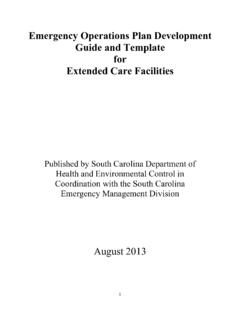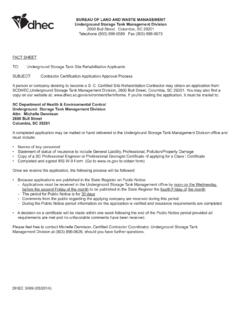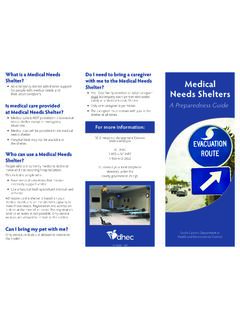Transcription of School and Childcare Exclusion List - scdhec.gov
1 CR-011634 11/20 School and Childcare Exclusion List Official School and Child Care Exclusion List of Contagious or Communicable Diseases Statutory authority: SC Code of Laws Sections 44-1-140, 44-29-200; 63-13-180 SC Code of Regulations Chapter 61-20 and Chapter 114, Article 5 Requirements South Carolina law requires schools to take measures to prevent the spread of disease in the School and Childcare populations by limiting the attendance of students and staff with contagious or infectious diseases at School and School activities. SC Regulation #61-20 requires DHEC to publish each year an Official School and Childcare Exclusion List of Contagious and Communicable Diseases, hereinafter referred to as the School and Childcare Exclusion List.
2 SC Law indicates that schools on account of the prevalence of any contagious or infectious diseases or to prevent the spread of disease, may prohibit or limit the attendance of any employee or student at any School or School -related activities under its control. SC Regulation states that schools, out-of-home Childcare providers, and parents/guardians should not allow the attendance of children with any contagious or infectious disease or syndrome requiring isolation .. if the disease or syndrome of the child or minor is on the Official School and Childcare Exclusion List of Contagious and Communicable Diseases.
3 Students, employees and staff (including volunteers) are also excluded from School or Childcare attendance if they have been exposed to one or more of the conditions designated in these lists, until the return to School or Childcare criteria are met. 2020 Updates The following updates were made to the School and Childcare Exclusion Lists: Coronavirus Infectious Disease 2019 (COVID-19) added to the Exclusion list. Diarrhea (E. coli O157:H7 and other Shiga Toxin-Producing E. coli (STEC)) Exclusion includes children under the age of 5 in out-of-home Childcare , in Kindergarten, and students 5 years of age or older thru grade 12.
4 Documentation for return to School with a parent note for students 5 years of age or older thru grade 12. Diarrhea Salmonella Typhi (Typhoid fever) Exclusion includes: o Children under 5 or staff in out-of-home Childcare or students under the age of 5 in Kindergarten. Culture independent diagnostic tests added as an option for a negative result. Specimens must be collected 1 week or more after antibiotics are completed. Diarrhea (Shigella) Exclusion includes children under the age of 5 or staff in out-of-home Childcare or students under the age of 5 in Kindergarten. Exclude students 5 years of age or older thru grade 12.
5 Fever without a known cause may require a negative COVID-19 testing or completion of COVID-19 Exclusion . o Exclusion of children in Childcare , students or staff with a temperature of F or CR-011634 11/20 greater. Head lice: Children can return to School with a parent note after one treatment with an over the counter or prescription lice elimination product. The School or Childcare may also allow children to return after crawling lice and nits have been removed from the hair by combing or heat treatment methods. This update to the School and Childcare Exclusion List is effective November 2020.
6 2 CR-011634 11/20 Guidance for Implementing the School and Childcare Exclusion List 1. The School and Childcare Exclusion List applies to the following groups of people in out-of- home Childcare , (as defined in Code Ann. Section 63-13-20), and in any public, private, parochial, church or Sunday School (Reg 61-20). o Children and staff in out-of-home Childcare settings; o Preschool/kindergarten students in grades 3K, 4K, and 5K; o Students in grades 1-12; and o School employees and staff (including volunteers) who have contact with students. 2. Parent Notification: Schools and Childcare providers are encouraged to distribute the list of conditions that require Exclusion from School attendance to parents/guardians, and/or distribute parent brochures developed by DHEC.
7 The list is also available at 3. Parent Reporting to School : Schools and Childcare providers should inform parents/guardians that they must notify the School within 24 hours after the child has developed a known or suspected communicable illness addressed on the Exclusion List. 4. Return to School : Students, children and staff may return to the School as soon as their symptoms are resolved, unless stated otherwise in the Exclusion List or by their health care provider. 5. Special Circumstances: Immunocompromised or medically fragile children with an excludable condition or exposure may need longer periods of Exclusion , subject to recommendations by their health care provider(s) or by DHEC.
8 For the purposes of School Exclusion , the term medically fragile refers to those students with special health care needs or developmental delays who require close assistance with feeding or other personal hygiene activities by which communicable illnesses may be easily spread. Nothing in these criteria precludes the exercise of the professional judgment of local education agency medical and/or nursing staff to protect the health of students. 6. Exclusion criteria that vary by age or grade level are indicated in the Exclusion List. Young children or younger children as indicated in the List are generally those in Childcare , preschool, or kindergarten grades.
9 When students are taught or routinely spend time in mixed age groups, the standards for the youngest children in the group apply. Conditions that do not require Exclusion for School and/or Childcare staff are indicated in the tables on the following pages. 7. Notes / Documentation for Return: A student may return to School as indicated in the tables that follow. Physicians, nurse practitioners, or physician assistants may provide medical notes for return to School following an excludable condition or DHEC may provide a release to return based on a negative test result or other circumstance. Medical notes, which document diagnosis, initiation of treatment, improvement in status, etc.
10 , and parent notes should be kept on file at the School for at least one calendar year, or as otherwise required by local School district policy. Medical notes may not shorten or abrogate the minimum period of Exclusion required by DHEC for any specific condition. 8. Period of Exclusion : If a student does not respond to treatment for an excludable condition, the health care provider or health department may suggest longer periods of Exclusion . 3 CR-011634 11/20 Guidance for Implementing the School and Childcare Exclusion List : During disease outbreaks or under special circumstances, DHEC may change the length of the Exclusion periods.










